The late Dick Drago was a former Red Sox pitcher; who knew he had deep ties to Rhode Island
The bullpen phone has rung for the last time for former Red Sox relief ace Dick Drago, who died in Tampa on Nov. 2.
The Boston Globe reported his death was from complications following surgery. He was 78.
I knew Dick for some 50 years, and considered him my best friend.
In the 1970s, in the days before the multi-million dollar player contracts, I ran a sports marketing company in Boston. We arranged autograph sessions to give players a little extra money in exchange for showing up at a mall or a car dealership.
I met Dick there and we hit it off immediately.
Dick’s time in Rhode Island
Later, he began spending the summer and early fall with me in Providence. He would come up in June when the heat got too much in Tampa, and would stay until the beginning of November.
He drove up alone initially, but after a few years I’d fly to Tampa, and we’d return at a leisurely pace. We planned a different route every year. I was into history and Dick was into music but as is often the case with friends, those interests rubbed off on each other.
He was also an excellent cook who enjoyed experimenting in the kitchen, trying new foods and recipes. (My own favorite kitchen appliance is the microwave, so his visits were a culinary blessing.)
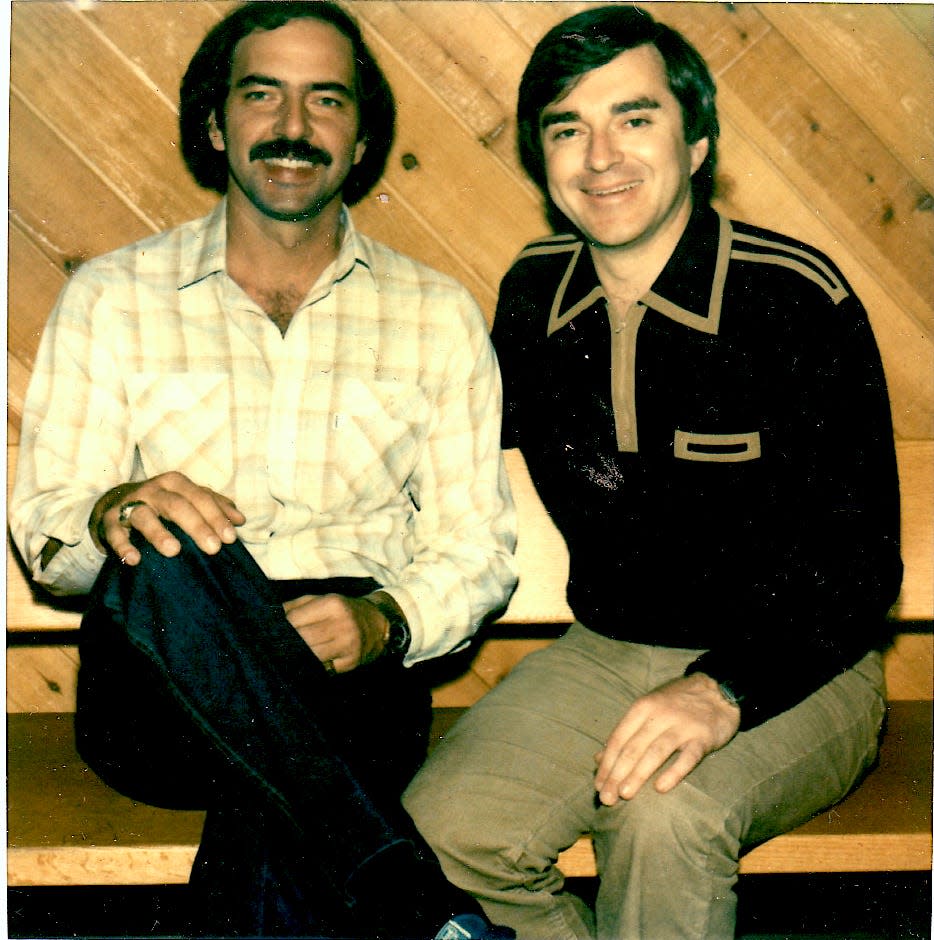
Over the years, he built a network of friends here
While Dick was fiercely proud of his 13-year major-league career, he was also very humble about it. He would never bring it up, but would respond expansively when asked.
Marie Sorman from Cumberland said, “He wasn’t a famous ball player for us. He was just our friend, a nice person and we will miss him.”
Her daughter Lesley Shapiro added, “Dick shattered many of my preconceptions of professional athletes. I never felt that he in any way judged me for not being a sports fan.”
Drago the ballplayer
Drago is not a well-known name to most, but he pitched some of the most important innings in pre-2004 Red Sox history: the ninth, 10th and 11th innings of the famous Carlton Fisk home run game in 1975.
Dave McCarthy, executive director of the Ted Williams Museum, said, “He will always be remembered by fans for his huge role in helping the Red Sox win the greatest game ever played — Game 6 of the 1975 World Series.”
Providence podiatrist Louis Simeone agrees. “I was a young boy then, and my parents let me stay up to watch the game. It was all we talked about in the schoolyard for days.”
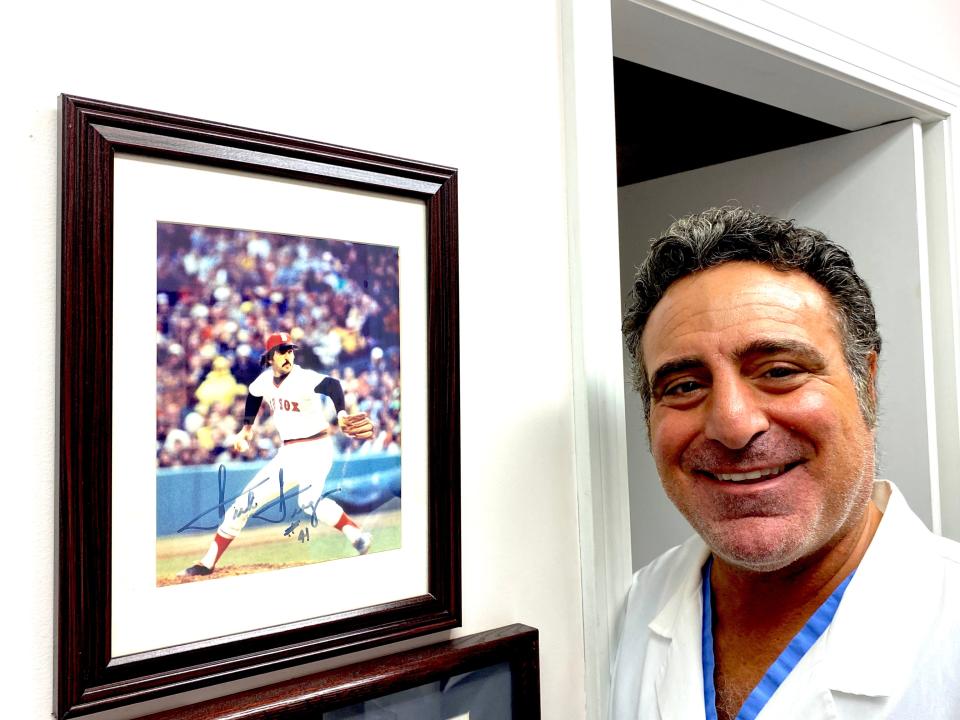
Years later, Drago needed treatment for a foot ailment, so I brought him to Dr. Simeone. “Are you THE Dick Drago?” Simeone asked.
“I’m flattered you remember me,” Dick responded.
Game 6 in Dick’s own words
“I was warming up,” Dick recalled. The score was 6-3, Cincinnati, and the Red Sox were four outs away from losing the series. With two outs in the bottom of the eighth, Bernie Carbo pinch hit a three-run homer.
“All of a sudden, it’s a tie game,” said Dick. “I pitched three shutout innings. facing three Hall of Famers (Bench, Morgan and Perez) along with Pete Rose. Succeeding in such a high stakes game is one of my biggest moments.”
Fisk hit his memorable home run in the bottom of the 12th to give the Red Sox the improbable victory.
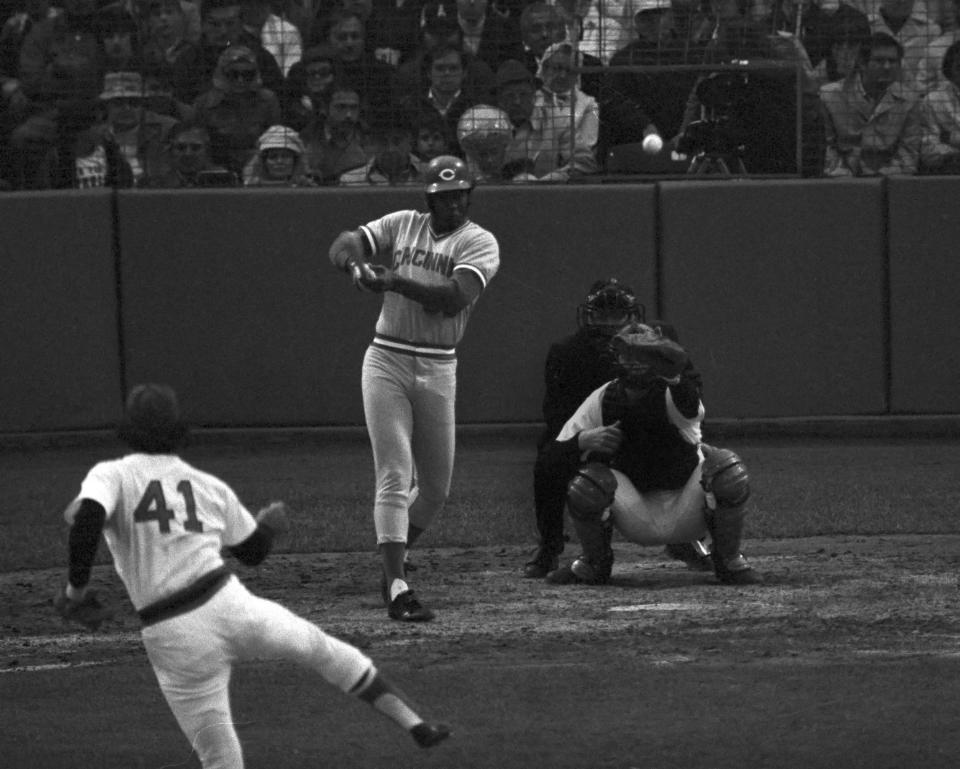
I spoke with Carbo a few days ago; he was as stunned as I was about Dick’s unexpected death.
“Dick was a very good teammate and an outstanding man,” Carbo said. “We played together in 1974 and 1975, sharing that great run in '75, but for most of our careers we wore different uniforms.
“I faced him all through the minors and later in the big leagues, playing for other teams. Not once did I ever get a hit off him. I went 0-for-my-lifetime against Dick Drago.”
Early days — Royals
Dick was a highly regarded high school prospect in Toledo. His goal was always to make it to the majors, and his dream was to pitch for Detroit. “I just wanted to play for the Tigers,” he said later. “That was my team. Al Kaline was my hero.”
He got his wish; the Tigers drafted him in 1964. Detroit won the World Series in 1968 with Dick in the minors, and he looked forward to fulfilling his dream the next season.
His world turned upside down that fall when Detroit left him unprotected in the expansion draft. Drago was selected by the Kansas City Royals.
“I was heartbroken,” he said. “All I wanted was to pitch for the Tigers. I didn’t even know where Kansas City was.”
To his credit, Dick sucked it up and went on to perform very well for a bottom-feeding team.
In 1971 he pitched 241 innings and won 17 games with a 2.98 ERA. By contrast, only five pitchers in all of baseball reached 200 innings in 2023, with the highest 216.
In 2019, Kansas City baseball writer Bradford Lee wrote that Drago still ranked in the top 10 in several pitching categories for the Royals, 50 years later. He hurled 53 complete games for KC in five years; the entire Royals staff has thrown only 54 over the last 19 years. “Dick Drago was the Royals’ first ace,” concluded Lee.
Hank Aaron’s last home run
In recent years he is best remembered for having surrendered Hank Aaron’s last home run.
Not number 715, the record breaking home run; diehard fans know that Dodger Al Downing gave that one up on April 8, 1974. But number 755. That was Drago.
The Red Sox traded Drago to the Angels in 1976 (he would return to Boston in 1978.) Aaron, then a 42-year-old designated hitter winding down his career with Milwaukee, stepped to the plate in the seventh inning on July 20, 1976. Both teams were in last place, and there were only about 10,000 fans in attendance. Aaron hit Dick’s first pitch into the grandstand.
“Who knew it would be the last one he ever hit?” Drago mused.
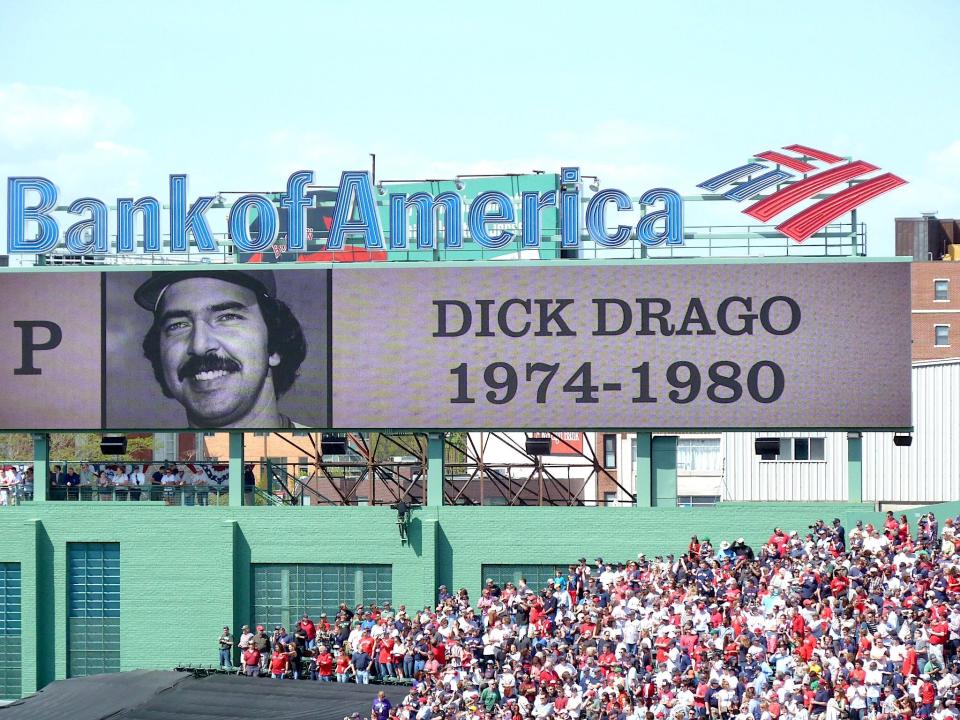
Baseball philosophy
The Red Sox were very important to Dick. “Boston was the greatest place to play,” he said. “They respect history, and no team in baseball treats their former players as well as the Red Sox do.”
Pam Kenn, Red Sox Senior Vice President of Community, Alumni and Player Relations, told me the feeling was mutual. “We sure did love him,” she said simply.
A couple of months ago Dick said, "I don't even watch the playoffs or World Series any more.” But he watched every pitch of every Red Sox game, year after year.
“Watched” is the operative word. He muted the sound. We would go weeks at a time watching silent baseball. I dared not touch the unmute button.
His daughter Dina Good confirmed, “He couldn’t stand listening to the announcers.”
He wished he could filter out the voices, and just hear the sounds of the game and the crowd, “the way it was when we sat in the dugout.”
He also groused about what he considered the coddling of pitchers today. “If a guy goes six innings now, that’s considered an accomplishment,” he would grumble.
When asked what was his favorite pitch, he would always answer “Strike one!” In tough situations, he would throw his best pitch — a high fastball. “Here, hit it!” he would say. He’d rather give up a solo homer than a walk.
As a player, Dick always had time for autograph seekers, especially kids. Later in life, Dick always treated fan mail and autograph requests with respect. He had a very clear, legible signature, which he proudly affixed to whatever was presented.
As his son Darren remarked, “He marveled that so many fans — and young fans — still wanted his autograph after all these years.”
Causes meaningful to him
Later in his life, Dick became fascinated with histories and documentaries, especially those with a military flavor. More than once he said, “I paid no attention to history in school and now I’m just catching up. I had no idea what our forefathers did to make this country great and to keep us safe.”
We attended a premiere of the "Band of Brothers" TV series. Three original soldiers from that unit participated. Their story touched Dick deeply, and from that point on, he was an ardent supporter of the military in general and veterans' causes in particular.
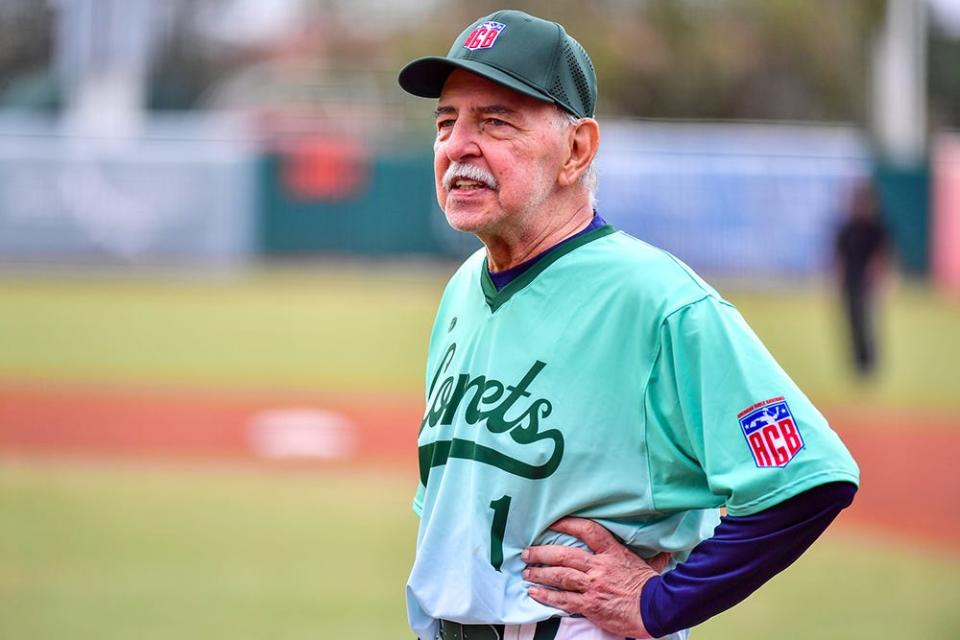
Sue Zipay, now 89, played two years for the Rockford Peaches of “League of Their Own” fame. Pursuing her dream of a new women’s league, Zipay organized the All-American Women’s Baseball Classic in Sarasota, Fla., in 2022. She attracted 60 of the country’s finest female baseball players, and several from Canada. They formed four teams and played a round-robin tournament. Drago was one of four former MLB players who coached those teams. He then spent the last year of his life as a vocal advocate for the organization.
He was scheduled to coach again at the second Classic. There was a moment of silence in his honor instead.
“He loved that program,” his son Justin emphasized. So much so that in his will he asked that donations be made in his name to: American Girls Baseball, 1811 Englewood Rd. #187, Englewood, FL 34223, www.americangirlsbaseball.org
This article originally appeared on The Providence Journal: Remembering Dick Drago, the Red Sox pitcher who had ties to RI

